A squeaky garage door can be more than just a minor annoyance; it can be a sign of underlying issues that may lead to more significant problems if left unaddressed. Regular maintenance and timely repairs are crucial to ensure the smooth operation and longevity of your garage door.
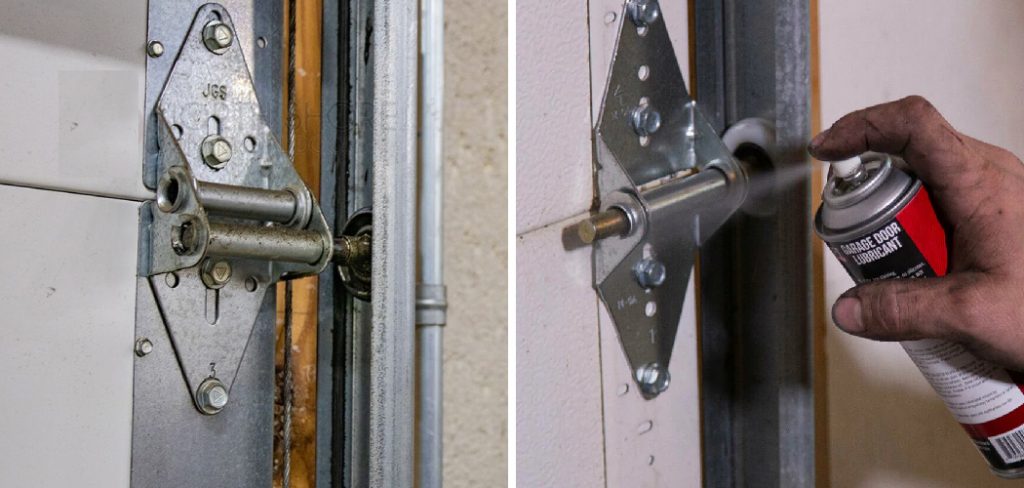
In this guide on how to stop squeaky garage door, we will cover the common causes of a squeaky garage door and provide practical steps you can take to silence the noise and keep your door functioning properly. Whether you’re a seasoned DIY enthusiast or a beginner, these tips will help you address the issue effectively.
What is Causing the Squeaking Noise?
Understanding the root cause of a squeaky garage door is the first step in resolving the issue. Several common culprits can contribute to the noise:
Lack of Lubrication:
One of the most frequent causes of a squeaky garage door is insufficient lubrication. The moving parts of the door, such as hinges, rollers, and springs, require regular lubrication to function smoothly. Without proper lubrication, these components can create friction and result in squeaking sounds.
Worn Out Rollers:
Over time, rollers wear down and may not glide as smoothly along the tracks, causing noise. Metal rollers, in particular, are prone to generating squeaks as they roll over metal tracks.
Loose Hardware:
The hardware on your garage door, including screws, bolts, and nuts, can become loose with frequent use. Loose components can cause the door to jolt and create annoying squeaks as it operates.
Worn Hinges:
Hinges that connect the door panels can become worn or misaligned over time, leading to metal-on-metal contact that produces a squeaky sound.
Misaligned Tracks:
If the garage door tracks are not properly aligned, the door may not move smoothly. Misalignment can cause increased friction and noise as the door opens and closes.
By identifying the specific cause of the squeak, you can apply the appropriate solution to ensure your garage door functions quietly and efficiently.
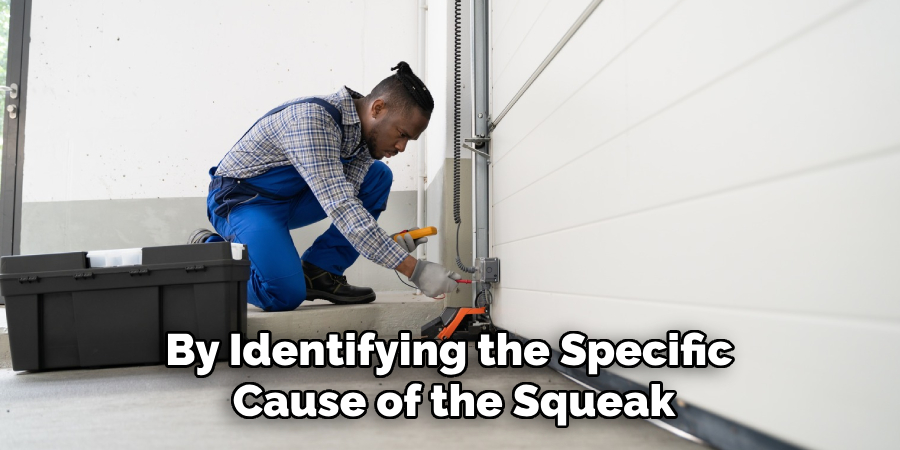
9 Step-by-step Guidelines on How to Stop Squeaky Garage Door
Step 1: Clean the Tracks and Rollers
The first step in silencing a squeaky garage door is to thoroughly clean the tracks and rollers. Dirt, debris, and built-up grime can contribute to friction and noise. Use a cloth dipped in soapy water to wipe down the tracks and rollers.
The tracks may need additional cleaning if there is a build-up of hardened grease. Use a scraper or a brush to remove the gunk, then wipe with a clean cloth.
Step 2: Apply Lubricant
After cleaning the tracks and rollers, the next step is to apply a high-quality lubricant to the moving parts of the garage door. Focus on lubricating the hinges, rollers, and springs to reduce friction and noise. Use a silicone-based spray or white lithium grease, as these types of lubricants are effective and long-lasting.
Start by applying the lubricant to the hinges, making sure to cover the pivot points thoroughly. Next, spray the lubricant on the rollers, especially the areas where they connect to the tracks. Finally, coat the springs with a generous amount of lubricant, ensuring even coverage.
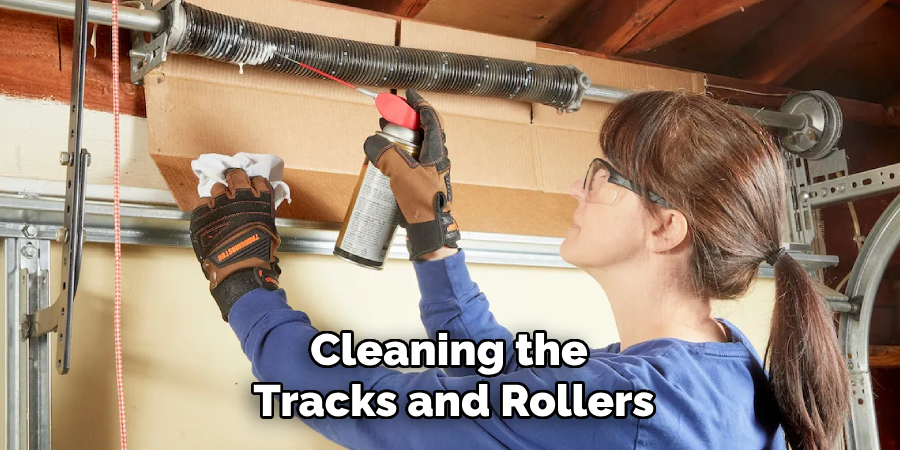
Avoid using WD-40 or other similar products, as these are not suitable for long-term lubrication and may attract dust and debris. Instead, stick to lubricants specifically designed for garage door components to ensure optimal performance and quiet operation.
Step 3: Inspect and Tighten Loose Hardware
Once you have cleaned the tracks and applied lubricant, the next step is to inspect all the hardware on your garage door. This includes screws, bolts, and nuts that may have loosened over time due to regular use and vibrations. Using a socket wrench or a screwdriver, carefully check each piece of hardware and tighten any that are loose.
Pay extra attention to the hinges that connect the door panels, as well as the brackets that hold the tracks in place. Additionally, make sure to inspect the mounting hardware for the garage door opener. Loose hardware can cause the door to move unevenly and produce squeaking noises, so ensuring everything is secure is crucial for quiet and smooth operation.
If any hardware appears worn or damaged, consider replacing it with new components. Keeping the hardware in good condition will help maintain the integrity of your garage door system and prevent future squeaks.
Step 4: Replace Worn Rollers
If the squeaking persists after cleaning and lubricating, it may be time to replace your garage door rollers. Over time, metal rollers can wear down and develop flat spots that cause them to make noise as they roll along the tracks. Additionally, plastic rollers can crack or become worn, resulting in friction and squeaking.
Replacing worn out rollers with new ones can significantly reduce noise levels and improve overall functionality. Make sure to choose high-quality rollers designed for your specific type of garage door. If you’re unsure which type of rollers you need, consult a professional or refer to your garage door’s manual.
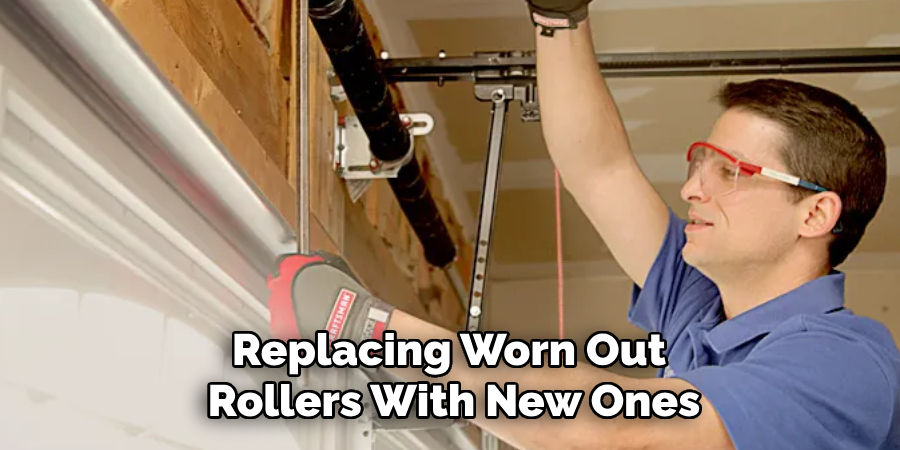
Step 5: Tighten Loose Hinges
As mentioned earlier, worn or loose hinges can contribute to a squeaky garage door. If you notice any of the hinges on your door are not secure, tighten the screws with a screwdriver. This will help reduce friction and noise when the door is in operation.
If a hinge appears severely damaged or cracked, it may need replacing. Consult a professional for guidance on choosing the right replacement hinge for your specific type of garage door.
Step 6: Check for Misaligned Tracks
Misaligned tracks can also cause squeaking by creating friction and putting strain on the garage door. To check if your tracks are misaligned, use a level to ensure they are even and plumb. If you notice any discrepancies, loosen the screws holding the tracks in place and gently tap them back into alignment with a hammer.
Once the tracks are realigned, tighten the screws and test the door’s operation. If it still makes noise, continue to adjust the tracks until they are perfectly aligned.
Step 7: Apply More Lubricant
If your garage door is still making squeaking noises after following all these steps, try applying more lubricant to key areas such as the tracks and rollers. Over time, lubricant can wear off or collect dust and debris, reducing its effectiveness in reducing friction.
Reapplying lubricant periodically can help keep your garage door running smoothly and silently.
Step 8: Consider Professional Help
If you have taken all of the above steps and your garage door is still making noise, it may be time to seek professional assistance. A trained technician can inspect your entire system and identify any underlying issues that may be causing the squeaking. They can also provide solutions such as installing a noise-reducing belt drive opener or replacing worn-out hardware for long-term quiet operation.
It’s essential to address any persistent noises from your garage door as they can indicate bigger issues that require immediate attention.
Step 9: Regular Maintenance
Once you have successfully silenced your squeaky garage door, it’s important to keep up with regular maintenance to prevent future noise issues. This includes periodically cleaning the tracks and applying lubricant, as well as inspecting and tightening loose hardware.
It’s also a good idea to schedule professional maintenance at least once a year, where a technician can thoroughly inspect and tune up your garage door system. Regular maintenance not only helps keep your garage door quiet but also extends its lifespan and prevents costly repairs down the road.
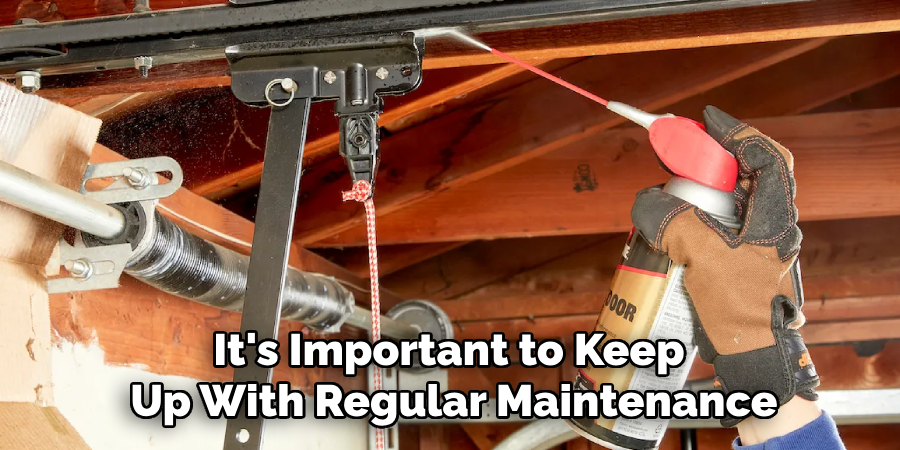
By following these steps on how to stop squeaky garage door and staying on top of regular maintenance, you can enjoy a quiet and smoothly functioning garage door for years to come.
Frequently Asked Questions
Q: Can I Use Any Type of Lubricant on My Garage Door?
A: No, it’s important to use a lubricant specifically designed for garage doors. Other products like WD-40 may provide temporary relief but can attract dust and debris, causing more issues in the long run.
Q: How Often Should I Lubricate My Garage Door?
A: It’s recommended to lubricate your garage door at least twice a year, or more if you notice any squeaking or resistance when opening and closing the door.
Q: What Type of Rollers Should I Use for My Garage Door?
A: The type of rollers you need will depend on the type of garage door you have. Consult a professional or refer to your manual for guidance on choosing the right rollers for your specific system.
Q: How Can I Tell If My Tracks Are Misaligned?
A: Use a level to check if your tracks are even and plumb. If you notice any discrepancies, they may be misaligned. Additionally, if you hear loud scraping or banging noises when the door is in operation, it’s likely due to misaligned tracks.
Conclusion
A squeaky garage door can be more than just a nuisance—it can be a sign of underlying issues that need attention. By following the comprehensive steps outlined in this guide on how to stop squeaky garage door, from cleaning and lubricating to replacing worn components and checking for alignment, you can effectively eliminate the annoying noises and ensure smooth operation.
Regular maintenance and periodic professional inspections are essential for keeping your garage door system in top condition, preventing future problems, and extending the lifespan of your door. Taking the time to address any squeaks promptly will not only provide you with a quieter home environment but also save you from costly repairs in the long run. Enjoy the peace of mind that comes with a well-maintained, noise-free garage door.
About
Safety Fic is a distinguished figure in the world of Diy design, with a decade of expertise creating innovative and sustainable Diy solutions. His professional focus lies in merging traditional craftsmanship with modern manufacturing techniques, fostering designs that are both practical and environmentally conscious. As the author of diy, Safety Fic delves into the art and science of Safety Fic-making, inspiring artisans and industry professionals alike.
Education RMIT University
(Melbourne, Australia) Associate Degree in Design (Safety Fic) Focus on sustainable design, industry-driven projects, and practical craftsmanship. Gained hands-on experience with traditional and digital manufacturing tools, such as CAD and CNC software.
Nottingham Trent University
(United Kingdom) Bachelor’s in diyfastly.com and Product Design (Honors) Specialized in product design with a focus on blending creativity with production techniques. Participated in industry projects, working with companies like John Lewis and Vitsoe to gain real-world insights.
Publications and Impact
In diy, Safety Fic his insights on indoor design processes, materials, and strategies for efficient production. His writing bridges the gap between artisan knowledge and modern industry needs, making it a must-read for both budding designers and seasoned professionals.
